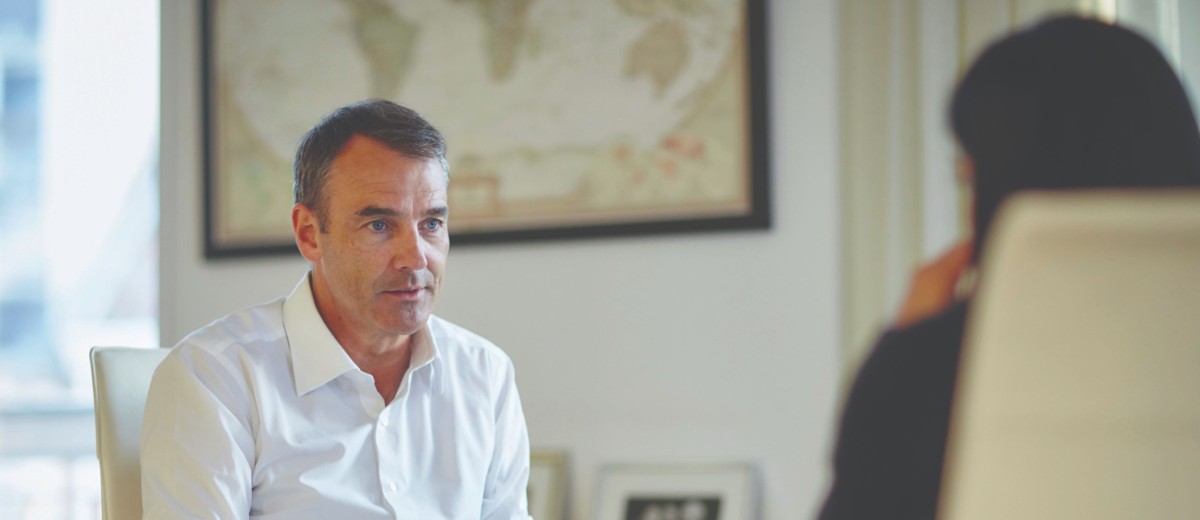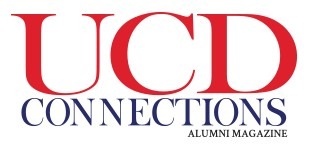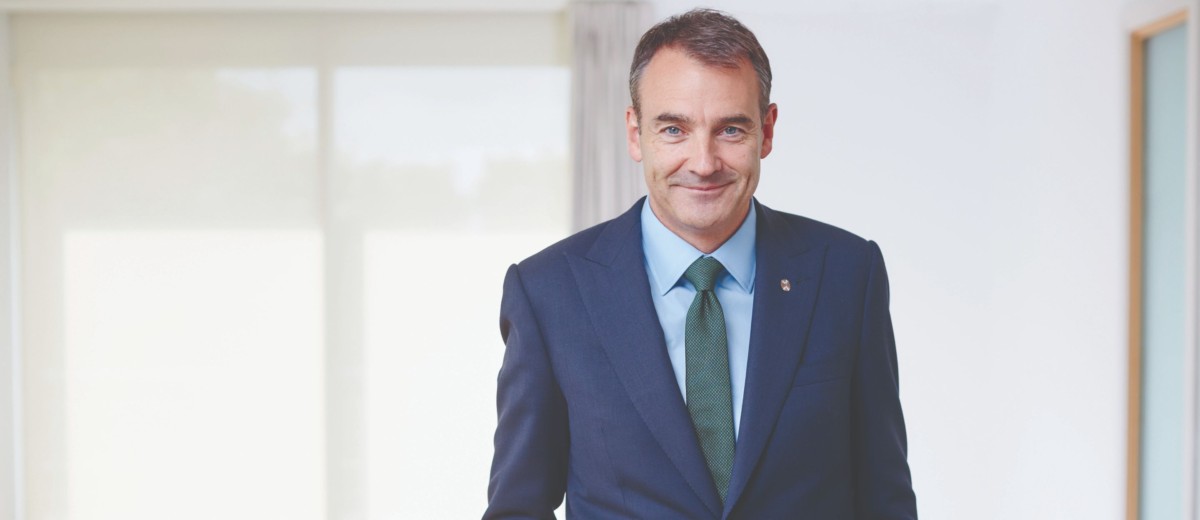BERNARD LOONEY’S first day at UCD, where he studied electrical engineering, didn’t exactly start smoothly, he recalls.
Newly arrived to ‘the big smoke’ from Ashgrove, near Kenmare in Co Kerry, where he grew up on the family farm, the 16-year-old missed his first day of lectures because he mistakenly went to the Belfield campus, when they were actually taking place in buildings that the University then had in the city centre, on Earlsfort Terrace. These days, the 48-year-old lives in London, where he is CEO of global energy giant BP’s Upstream division, which finds and produces oil and gas, while investing in renewable energy and cleaner technologies.
Within the industry, and in the media that cover it, he’s seen as one of several contenders for the top job at the firm in the near future. The company is no stranger to employing Irishmen in senior roles. Fellow UCD alumnus, the late Peter Sutherland, spent 13 years as its chairman.“Peter was very supportive and a key source of inspiration as a fellow Irishman who had succeeded on the world stage,” Looney recalls.
For now, Looney’s current role sees him in charge of about 17,000 staff and about 20 per cent of the approximately €260bn turnover of the firm. His division spends about €7bn to €8bn running its operations in 29 countries, and invests €11bn to €12bn on top of that.
He looks back very fondly on his time at UCD. “UCD was very formative for me in many ways. It gave me a sense of confidence that I didn’t have. I attended quite young, just before my 17th birthday, and graduated when I was 20. Coming from my rural background, it was my step into big city life, you could say.
“I went home every few weeks, it could be quite lonely leaving home on a Sunday evening, getting the train from Killarney to Heuston Station, and then a bus to Rathmines where I lived in a basement flat, which I rented for IR£11 a week. My landlady would give me a loaf of bread, and I would bring a couple of pounds of meat from home.
“I enjoyed being at home. Rural life in Kerry was fairly one-dimensional in terms of who we knew; there was little diversity. I was one of five siblings, and our parents had a small dairy farm. Only about eight out of our 90 acres were actually arable, on which we had 14 cows. My older brothers overhauled and sold on Ford tractors to help make ends meet.”
He found his lecturers very encouraging, he says, recalling his time at UCD. “Professor Paul Curran and Professor Mark O’Malley were relatively young at the time. They felt modern. My mother used to tell my brother I was no good at maths, and I persevered with a nagging feeling that I wasn’t cut out for engineering.
“But Professor Curran and Professor O’Malley were very supportive. That meant more to me than you can imagine. My time at UCD taught me that the ethic I already had about hard work from the family farm continued, and they encouraged that. It encouraged me to be inclusive and respectful of diversity, and aware of the importance of teamwork. I’m extremely grateful for that, and it’s thanks to them and my fellow students that I had that start in life.”
“I think that if I were studying engineering today, I’d be learning a lot more about business, societal impacts, and ethics.”
Earlier this year, Looney visited his alma mater, meeting UCD President, Professor Andrew J Deeks, and Executive Director, UCD Foundation, Orla Tighe. As someone who took an MBA at the prestigious Stanford University, and who spends half his time travelling the world in his current role, overseeing a huge and diverse global workforce, how does Looney view UCD’s education offering today?
“My overarching impression from that day was of the ambition of the University. Professor Deeks has a compelling and inspiring vision. Regardless of where it might be placed in the global university rankings, Ireland’s educational brand feels very strong in the world, and I think justifiably so.
“The global nature of the student population is encouraging. The earlier students can be introduced to people and ways of thinking from Africa, China and Latin America is increasingly important. I had a very interesting day hearing about the work going on at the Energy Institute, and in areas such as data science. I think that if I were studying engineering today, I’d be learning a lot more about business, societal impacts, and ethics. I think we need experts in the world who are deep engineers, and those who understand the world, society and its challenges.”
The fact that BP is the world’s sixth largest energy company means it has an important role to play in tackling those challenges. Looney emphasises some of his division’s work on reducing its environmental impact, while investing in renewable energy and cleaner technologies. Underpinning the strategy is an energy transition, where production of gas – a comparatively cleaner fuel – takes a lead over oil, which produces more carbon dioxide.
An example of this work has been the €25bn Shah Deniz 2 project to deliver gas from Azerbaijan to Europe. It involved 500km of new pipeline being constructed, and 28,000 people working for 180 million hours. It recently won the major project award by the Royal Academy of Engineering in London.
Climate change has perhaps never been discussed more in media and society than in recent months. One hundred companies are responsible for 71 per cent of global carbon emissions, according to the Carbon Disclosure Project’s Carbon Majors Report 2017, and BP is ranked eleven on that list.
“This is not a straightforward subject, and something like the idea that oil and gas can be banned overnight isn’t realistic, because the world isn’t that simple and straightforward. People in countries like Indonesia and West Africa have different needs to us in the West. The Pope has talked about how civilisation requires energy, but energy use must not destroy civilisation,” says Looney.
“Emissions need to go down, and quickly. We need to do that responsibly and sustainably. BP has many stakeholders: shareholders, society, and our staff. Their expectations are merging, and we will continue to look at business opportunities where we feel part of helping and accelerating investment in renewable energy and clean technologies. This is also a huge topic in our company, as well as in wider society. We’ve set ambitious targets for reducing our own emissions. In May this year, at our AGM, shareholders overwhelmingly voted for us to disclose how our business is consistent with the Paris Agreement [to keep the global temperature increase below 1.5 degrees above pre-industrial levels].
“I believe we are part of the solution … As a leader I feel I should listen. ”

“I believe we are part of the solution. More and more I think, as a leader, I feel I should listen, in order to understand, rather than in order to respond because I feel I should have an answer. We believe in the net zero emissions target for countries in the Agreement,” he adds.
However, BP shareholders did not support it setting hard targets for emissions from its products. Critics point out that investing up to $1bn a year in renewables is less than 0.5 per cent of its revenues. Looney counters that it’s $1bn, but out of a $15bn overall annual investment. He also highlights the fact that a $200m investment by BP in solar power firm Lightsource helped to leverage $7bn of projects around the world, the equivalent of powering three million homes in the UK or Ireland.
In aviation fuel, Looney is ambitious for an investment in Fulcrum Bioenergy, which makes jet fuel from household waste that cuts emissions by 80 per cent, though current production levels are relatively very low.
“Fulcrum is very much in expansion mode. Imagine if we can help aviation cut its emissions by 80 per cent,” Looney says. BP has also invested in Chargemaster, the UK’s largest electric vehicle charging network. It is adding 200 rapid chargers in the UK, to add to 450 existing ones among over 7,000 of its charging points.
Looney is a fan of electric cars, but actually doesn’t own a car himself, preferring to take taxis or public transport. He’s also a passionate advocate of emerging and cutting-edge technologies. Meeting him at BP’s central London headquarters, he enthused about everything from software bots and robotic pipeline crawlers to how it uses fibre-optic wires to monitor wells.
On a large touchscreen on one of his office walls, live data from all the Upstream division’s activities is streamed in real time, giving a picture of the performance of drilling and production around the globe and the related financial numbers.
A snapshot of recent work includes visits to India and Rio de Janeiro, and meeting the Prime Minister of Trinidad in London, as well as talking to staff in Houston about the aforementioned software bots.
Looney recounts how he spent time with technology investment arm, BP Ventures, in California, sharing insights with car companies including Mercedes and Renault, car parts maker Bosch and ridesharing app firm Uber.
“One thing we’re trying to do is become the first agile oil and gas company, empowering our people, removing management layers, and increasing staff autonomy. We’ve looked at agility in technology and banking, and we would say that 4,500 of our people – a quarter of my staff – are now agile in how they approach their work,” he explains.
He has worked for BP for 29 years, starting out as a drilling engineer in various locations, then working in Alaska in a senior VP role, rising to MD of BP North Sea, and then in development and production roles before his current one.
The charismatic Kerryman emphasises the importance of diplomacy and humility in a role where he often meets with heads of state. “We work with governments, but we are guests in their countries. Our job is to work with whoever is in power to do what we can to help countries achieve their objectives. We try to do it well, but we don’t always get it right,” he adds.
The only one in his family to go to university, he was encouraged to read everything he could by his mother, who was a big believer in education. “She said if I could read, I could do anything.” Neither parent stayed in school beyond eleven.
When asked about his idea of success, he frames his answer as a reflection on leading and managing people. “The thing I enjoy most about my work is meeting great people from all around the world, and helping them. At a dinner in Cairo last year, I met a young female mechanical engineer who had worked for BP there for twelve years. Her integrity, values and behaviour resonated with me, as did her management skills and efforts to become a chartered engineer.
“She recently came to London for a week to shadow myself and my team. She really contributed, including in some highly sensitive discussions. She will return home, having learned a lot. That gives me a lot of pleasure. A saying I recall is that your title makes you a manager, but it is your people who make you a leader.”
Written by John Reynolds
Photography Graham Trott

